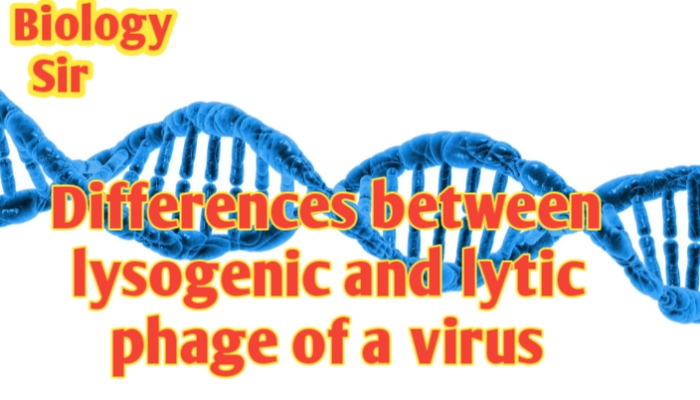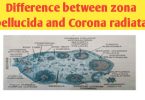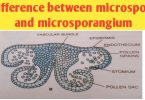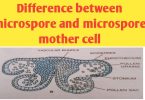Differences between lysogenic and lytic phase of a virus, hi guys in this article we know about lysogenic phage and lytic phage of a virus and difference between these two.
Action of most of viral gene is to enable the viruses to infect their respective host cells multiply by using the host machinery such as enzymes and ribosomes and then causing the lysis of cells. After the lysis of host cells many viruses get liberated with get infect new for cell to repeat the lytic cycle. Sometimes viruses may integrate with host chromosome and replicate along with it to constitute lysogenic cycle.
Multiplication of bacteriophages in E coli prominent suggested 3 stages of bacteriophages extracellular virion, vegetative phase and prophase. The complete virus particles prior of infection are extracellular virions. The other two stage is intracellular are only in form of nucleic acid. Those phases having the capacity to become prophase are called temperate phage and those which lack this property are called Virulent phages.
What is lytic cycle of a virus? The multiplication process of virulent phase is called lytic cycle of virus because the host bacterial cell is lysed at the end, this process is divided into following stages:- 1) adsorption , 2) penetration,3) eclipse phase, 4) maturation and 5) lysis and release of new virion. Adsorption is the attachment of virus particle to the specific host bacterial cells. the attachment is at the specific receptors side present on the wall of host cell, bacteriophage attached to host with help of tail fibre to host receptor site.
The next phase is the penetration which is injection of nucleic acid of virion into the host cell. The nucleopeptidyl host cell wall is hydrolysed by lysozyme present at the tip of tail making a hole through which the virion nucleic acid is injected into the host cell via tail tube, this happen when tail fibre after an attachment, bringing the base plate in contact with bacterial cell wall. The protein coats remaining outside attached to the host cell wall are called “Ghost”. After that eclipse stage, maturation and lysis and release of new virion will happen.
What is lysogenic phage of virus? In lysogenic cycle of virus the injected DNA of virus get attached to bacterial DNA become inactive and is called prophase, here it does not take over the machinery of host but a replicate along with host chromosome. in other words phase DNA replicate only when bacterial chromosome replicate and will stay there is symbiont rather than parasite.
What is differences between lysogenic and lytic phage of a virus? In lysogenic cycle the viral genome get integrated with host DNA and replicate when chromosomal bacterial chromosome replicate and it does not use bacterial machinery for replication. However in Lytic phase viral DNA get penetrated inside the host cell, used machinery for multiplication, finally infected the cell and lysis and release of new virion.
Differences between lysogenic and lytic phase of a virus
What is differences between lysogenic and lytic phage of a virus? In lysogenic cycle the viral genome get integrated with host DNA and replicate when chromosomal bacterial chromosome replicate and it does not use bacterial machinery for replication. However in Lytic phase viral DNA get penetrated inside the host cell, used machinery for multiplication, finally infected the cell and lysis and release of new virion.

Differences between lysogenic and lytic phase of a virus
Now briefly explain the differences between lysogenic and lytic phase of a virus following to the point:-
Lysogenic phage:-
1) the viral genome get integrated with host DNA to form prophase.
2) the host bacterial DNA is not hydrolysed
3) prophase replicates only once
4) cellular machinery of cell works normally
5) it is non virulent or temperate phage
6) virus particles are not liberated
7) lysis of host cell does not take place.
Lytic phase:-
1) the viral genome do not integrate with bacterial host DNA
2) bacterial host DNA is hydrolysed
3) viral genome replication many times
4) control of cellular machinery of cell is incompletely taken over by viral genome
5) virus is virulent
6) due to lysis of host cell virus particles are liberated
7) lysis of cell takes place.







Leave a Comment